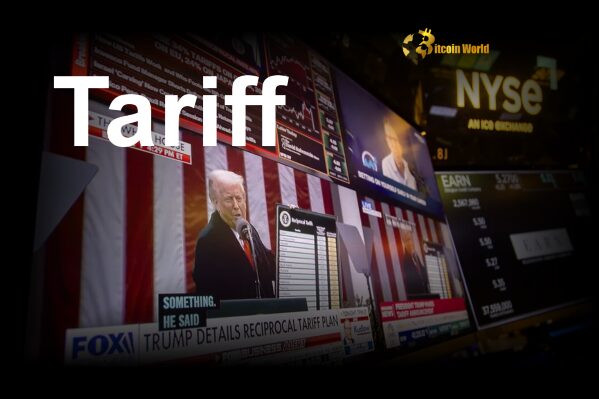BitcoinWorld

Crypto ETFs: Unprecedented $12.8 Billion Inflows Ignite Market Surge
The world of digital assets just hit a monumental milestone, sending ripples of excitement across global financial markets. July witnessed an unprecedented surge in investment into Crypto ETFs, with a staggering $12.8 billion flowing into U.S.-listed products. This isn’t just a number; it’s a powerful statement about the evolving landscape of finance and the growing confidence in digital currencies. For many, Crypto ETFs offer a gateway to the volatile yet lucrative cryptocurrency market, combining the innovative spirit of digital assets with the familiarity of traditional investment vehicles. This record-breaking inflow underscores a pivotal moment, signaling mainstream adoption and a robust appetite for crypto exposure among both institutional and retail investors.
What’s Driving the Phenomenal Surge in Crypto ETFs?
The figures speak for themselves. U.S.-listed Crypto ETFs experienced a record $12.8 billion in inflows during July, a period where the broader market, as measured by the CoinDesk 20 Index, climbed over 21%. This remarkable performance is largely attributed to increasing institutional interest and a maturing market infrastructure. A standout performer in this wave of investment is BlackRock’s iShares Bitcoin Trust (IBIT). IBIT’s asset accumulation has been nothing short of extraordinary, now holding over $86 billion. This impressive figure places IBIT among the top-tier ETFs globally, surpassing long-established giants like the iShares Core S&P 500 ETF (IVV) and the iShares Russell 2000 ETF (IWM) in terms of asset growth rate, according to data reported by CoinDesk. This rapid ascent of IBIT highlights a significant shift in investor preference and confidence towards regulated crypto investment products. The sheer scale of these inflows suggests that traditional financial players are not just dabbling in crypto; they are committing substantial capital, viewing Crypto ETFs as a legitimate and integral part of diversified investment portfolios.
| ETF Name | Approx. AUM (July Data) | Primary Asset Focus |
|---|---|---|
| iShares Bitcoin Trust (IBIT) | $86 Billion+ | Bitcoin |
| Grayscale Bitcoin Trust (GBTC) | $25 Billion+ | Bitcoin |
| Fidelity Wise Origin Bitcoin Fund (FBTC) | $10 Billion+ | Bitcoin |
Why Are Investors Flocking to Crypto ETFs?
The appeal of Crypto ETFs stems from several key advantages they offer over direct cryptocurrency ownership. For many investors, particularly those accustomed to traditional financial markets, ETFs provide a familiar and accessible entry point into the digital asset space. There’s no need to grapple with complex crypto wallets, private keys, or the intricacies of decentralized exchanges. The ease of investment is a major draw.
Here are some of the primary reasons investors are increasingly choosing Crypto ETFs:
- Simplified Access: Investing in Crypto ETFs is as straightforward as buying shares in any traditional stock or fund through a standard brokerage account. This removes significant technical barriers for new entrants.
- Regulatory Oversight: U.S.-listed Crypto ETFs operate within a regulated framework, offering a layer of investor protection and legitimacy that direct crypto holdings might not always provide. This appeals to risk-averse investors and large institutions.
- Professional Management and Custody: These ETFs are managed by established financial institutions that handle the complexities of cryptocurrency custody, security, and rebalancing. This mitigates many of the operational risks associated with holding digital assets directly.
- Diversification Potential: Some Crypto ETFs offer exposure to a basket of cryptocurrencies or specific sectors within the crypto market, providing diversification without the need to individually select and manage multiple digital assets.
- Liquidity: Being traded on major stock exchanges, Crypto ETFs offer high liquidity, allowing investors to buy and sell shares easily throughout the trading day.
These factors collectively contribute to the growing popularity and trust in Crypto ETFs as a viable investment vehicle for gaining exposure to the dynamic world of cryptocurrencies.
Are There Challenges or Risks with Crypto ETFs?
While the allure of Crypto ETFs is undeniable, it is crucial for investors to understand that these products are not without their own set of challenges and risks. Like any investment, particularly those tied to nascent and rapidly evolving markets, due diligence is paramount. Despite their regulated nature, Crypto ETFs inherit many of the volatilities inherent in the underlying digital assets.
Key considerations and risks associated with Crypto ETFs include:
- Market Volatility: The cryptocurrency market is known for its significant price swings. Even though Crypto ETFs offer a regulated wrapper, they are still directly exposed to this volatility, meaning their value can fluctuate dramatically in short periods.
- Tracking Error: While ETFs aim to track the performance of their underlying assets, minor discrepancies, known as tracking errors, can occur due to various factors like management fees, operational costs, and market inefficiencies.
- Management Fees: Like all ETFs, Crypto ETFs charge management fees (expense ratios) that can eat into returns over time. Investors should carefully review these fees before investing.
- Regulatory Evolution: Although current Crypto ETFs are regulated, the broader cryptocurrency regulatory landscape is still evolving. Future regulatory changes could impact the operation or even the viability of certain crypto products.
- Custody and Security Concerns: While professional custodians manage the underlying crypto assets, the risk of hacks or security breaches, though rare with established custodians, is always a theoretical concern in the digital asset space. Investors rely on the ETF provider’s security measures.
- Limited Scope: Currently, most major Crypto ETFs in the U.S. track Bitcoin. While there is growing interest in Ethereum and other altcoin ETFs, the options for broad diversification within a single ETF are still somewhat limited compared to traditional asset classes.
Understanding these potential drawbacks is essential for making informed investment decisions and managing expectations when incorporating Crypto ETFs into a portfolio.
How Do Leading Crypto ETFs Compare and What Does it Mean?
The emergence of BlackRock’s iShares Bitcoin Trust (IBIT) as a dominant force in the Crypto ETFs landscape is a significant development. Its rapid accumulation of over $86 billion in assets under management (AUM) is a testament to the trust and capital that institutional investors, in particular, are now placing in the Bitcoin market through regulated channels. This success is not isolated; other Bitcoin ETFs from major players like Fidelity (FBTC) and ARK Invest/21Shares (ARKB) have also seen substantial inflows, collectively contributing to the record-breaking figures.
The comparison with established ETFs like IVV (iShares Core S&P 500 ETF) and IWM (iShares Russell 2000 ETF) is particularly insightful. While IBIT has not yet surpassed their total AUM, its growth rate in such a short period is unparalleled. This indicates a powerful shift in capital allocation, where a growing portion of investment portfolios is being directed towards digital assets via these accessible and regulated instruments. The backing of financial giants like BlackRock, with their extensive experience and robust infrastructure, lends considerable credibility to the Crypto ETFs market. This institutional validation helps to alleviate concerns about market integrity and security, drawing in a broader spectrum of investors who might have previously been hesitant to enter the crypto space directly. The sheer volume of inflows into these products suggests that Bitcoin, and potentially other major cryptocurrencies, are increasingly being viewed as legitimate assets within mainstream finance, rather than niche speculative instruments.
What Actionable Insights Can Investors Glean from Crypto ETF Inflows?
The monumental inflows into Crypto ETFs are not just headline-grabbing figures; they offer crucial insights for both seasoned investors and newcomers to the digital asset space. Understanding these trends can help inform investment strategies and provide a clearer picture of the market’s direction.
Here are some actionable insights derived from the recent surge in Crypto ETF investments:
- Mainstream Validation: The record inflows signal a significant step towards mainstream acceptance of cryptocurrencies. This institutional adoption could lead to greater market stability and liquidity over the long term. Investors should recognize that digital assets are becoming an increasingly integrated part of the global financial system.
- Accessibility Matters: The success of Crypto ETFs underscores the demand for easier, more regulated ways to access crypto exposure. For those wary of direct crypto purchases, ETFs offer a convenient alternative. Consider if an ETF aligns better with your risk tolerance and technical comfort level.
- Diversification Potential: As more varied Crypto ETFs emerge (beyond just Bitcoin), they could offer broader diversification within a portfolio, allowing exposure to different segments of the digital asset market without the need to manage multiple individual cryptocurrencies.
- Long-Term Perspective: While short-term market movements will always occur, the consistent inflow into Crypto ETFs suggests a growing long-term conviction among investors. This trend encourages a strategic, rather than purely speculative, approach to crypto investments.
- Due Diligence is Key: Despite the positive sentiment, it is vital to research any Crypto ETF thoroughly before investing. Understand its underlying assets, expense ratio, tracking methodology, and the reputation of the fund provider. Do not solely rely on headline figures.
- Stay Informed: The crypto market and its regulatory environment are dynamic. Continuous learning and staying updated on developments in the Crypto ETFs space will be crucial for making informed decisions.
These insights suggest that Crypto ETFs are not just a passing fad but a significant evolution in how investors interact with the digital asset economy, opening new avenues for portfolio growth and diversification.
The record $12.8 billion inflow into Crypto ETFs in July marks a watershed moment for the digital asset ecosystem. It is a powerful affirmation of growing investor confidence, driven by increasing regulatory clarity, the robust infrastructure provided by traditional financial giants, and the inherent appeal of accessible exposure to cryptocurrencies. BlackRock’s IBIT, in particular, has emerged as a testament to this shift, demonstrating that institutional capital is not just dipping its toes but diving deep into the crypto waters through regulated channels. While challenges and risks remain, the trajectory is clear: Crypto ETFs are solidifying their position as a crucial bridge between traditional finance and the innovative world of digital assets. This ongoing integration promises to reshape investment portfolios and bring cryptocurrencies further into the mainstream, ushering in an exciting new era for global finance.
Frequently Asked Questions (FAQs)
- What is a Crypto ETF?
A Crypto ETF, or Exchange-Traded Fund, is an investment fund that tracks the price of one or more cryptocurrencies. It allows investors to gain exposure to digital assets through traditional brokerage accounts without directly owning the underlying cryptocurrency. These funds trade on stock exchanges, much like stocks or traditional ETFs. - Why are Crypto ETFs becoming so popular?
Their popularity stems from several factors: ease of access for traditional investors, regulatory oversight that provides a sense of security, professional management of crypto assets (including secure custody), and the ability to diversify a portfolio without the complexities of direct crypto ownership. - Are Crypto ETFs a safe investment?
While Crypto ETFs offer a regulated and professionally managed way to invest in cryptocurrencies, they are still subject to the inherent volatility of the underlying digital asset market. They are not entirely risk-free, and their value can fluctuate significantly. Investors should assess their risk tolerance and conduct thorough research. - How do I invest in Crypto ETFs?
You can invest in Crypto ETFs through a standard brokerage account, similar to how you would buy stocks or other ETFs. You will need to open an account with a brokerage firm that offers these products and then place an order for the desired ETF. - What’s the difference between a Bitcoin ETF and other Crypto ETFs?
A Bitcoin ETF specifically tracks the price of Bitcoin, making it the sole underlying asset. Other Crypto ETFs might track a basket of different cryptocurrencies (a multi-coin ETF) or focus on specific sectors within the crypto ecosystem, offering broader or more targeted exposure beyond just Bitcoin. - How do institutional investors impact Crypto ETFs?
Institutional investors, such as large asset managers and hedge funds, bring substantial capital and credibility to the Crypto ETF market. Their participation, as seen with BlackRock’s IBIT, validates the asset class and can contribute to increased liquidity, market stability, and further mainstream adoption.
If you found this article insightful and believe in the transformative power of Crypto ETFs, please share it with your network! Help us spread awareness about these significant developments in the digital asset market.
To learn more about the latest crypto market trends, explore our article on key developments shaping Bitcoin institutional adoption.
This post Crypto ETFs: Unprecedented $12.8 Billion Inflows Ignite Market Surge first appeared on BitcoinWorld and is written by Editorial Team





